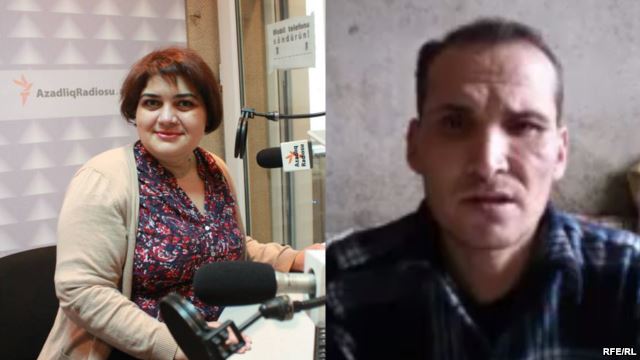RFE/RL journalists remain behind bars, despite demands for release

WASHINGTON — On February 5, RFE/RL contributor Khadija Ismayilova will mark 14 months behind bars in an Azeri prison, despite widespread condemnation of her case and high-profile demands for her release.
The day also marks the 38th birthday of RFE/RL Turkmen contributor Saparmamed Nepeskuliev, who has been held incommunicado by Turkmen authorities since July 2015.
In the latest appeal on her behalf, U.S. Representative Ed Royce (R-Calif), who chairs the House Foreign Affairs Committee, wrote a letter to Azerbaijan’s president on January 28, calling the charges against Ismayilova “dubious” and warning that her continued detention, and the imprisonment of other journalists, “will harm relations between our two countries.”
Royce’s letter followed the introduction in December of H.R.4264, theAzerbaijan Democracy Act, a bill sponsored by U.S. Representative Christopher Smith (R-N.J.), the chairman of the Committee for Security and Cooperation in Europe and co-sponsored by U.S. Representative Louise Slaughter (D-N.Y.). The proposed legislation would deny U.S. visas to senior Azeri officials found to have participated in, or have benefitted from, “policies or actions… that undermine democratic institutions or impede the transition to democracy in Azerbaijan.”
In another expression of international support, prominent human rights lawyer Amal Clooney announced she would represent Ismayilova when her case comes before the European Court of Human Rights.
Ismayilova was detained by Azerbaijani law enforcement on December 5, 2014, and sentenced to 7.5 years in prison in September 2015 on charges widely viewed as retaliation for her reporting linking members of President Ilham Aliyev’s family members to massive foreign real estate holdings, controlling stakes in the country’s telecom and airline industries, and ownership of Azeri gold mines.
Unlike Ismayilova’s case, which has generated interest in part because of Azerbaijan’s well-publicized efforts to cultivate international respectability, Nepeskuliev’s case is far less known. There is scant documentation available about his alleged crimes, trial, and conviction, and his whereabouts are uncertain. Says RFE/RL Turkmen Service Director Muhammad Tahir, “We have heard nothing about him since his arrest six months ago. We have had no access to his family, and cannot even confirm that he is alive.”
The UN’s Working Group on Arbitrary Detention issued an opinion on Nepeskuliev’s case in December, finding his deprivation of liberty to be arbitrary.
Before he disappeared, Nepeskuliev contributed video reports to RFE/RL’s Turkmen Service and worked as a correspondent for Alternative Turkmenistan News. In September 2015, Nepeskuliev was apparently sentenced to serve a prison term, prompting the media defense organization “Reporters Without Borders” to comment, “Where exactly is Nepeskuliev now? Has he or has he not been sentenced to three years in jail? Has he had a lawyer? All of these questions remain unanswered.”
